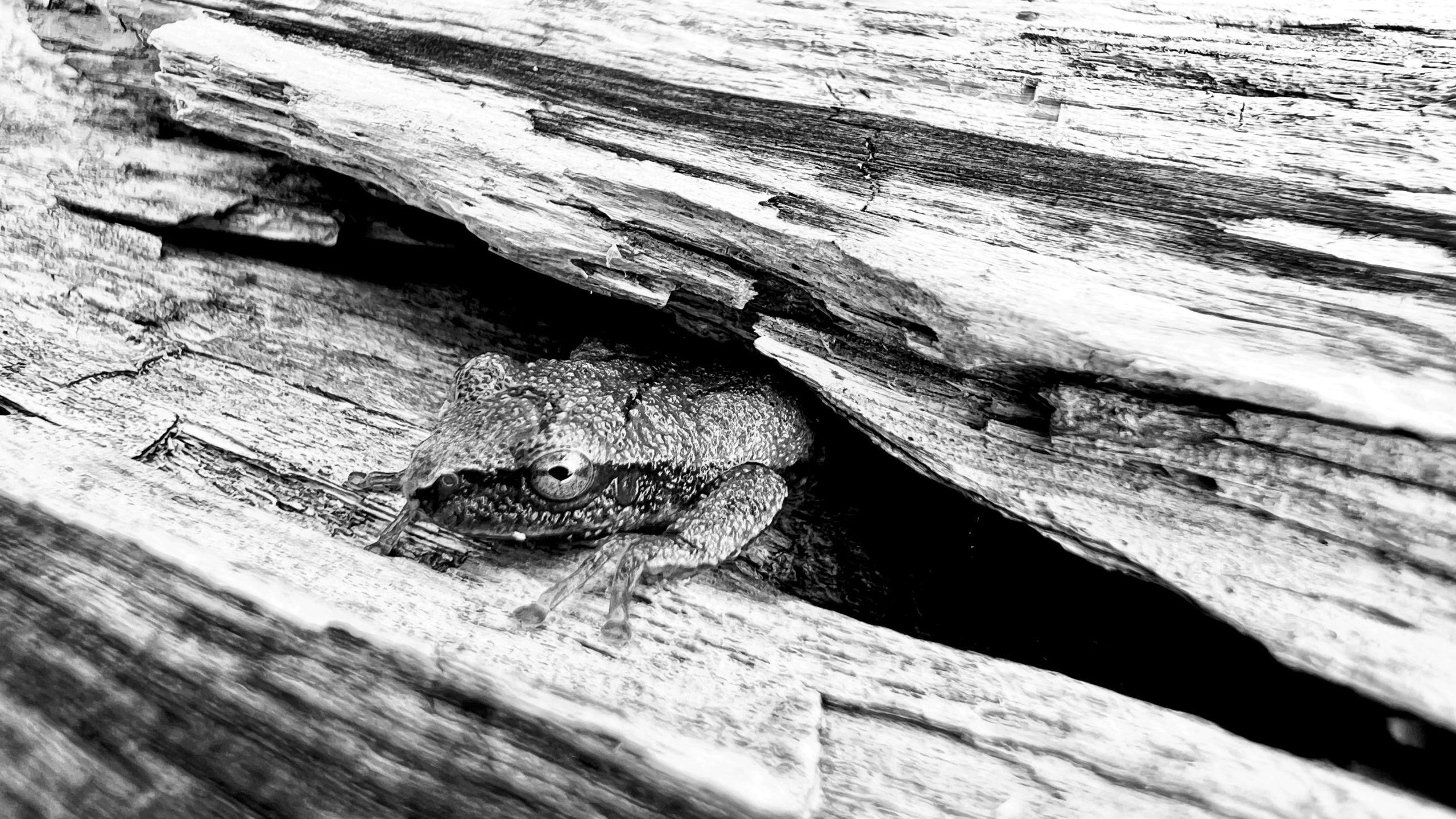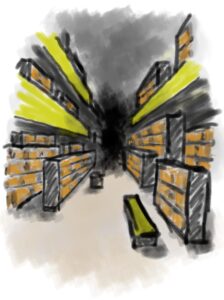Dust swirled up around the dented metal skin of the ship as pilot Souk Baijin and navigator Charle Sage twisted and banked along the canyon bed. A river had flowed here, once, but now there was nothing but stone and sand, whipped up into so many small cyclones that briefly marked their passage. Abruptly, they stopped, reversed through a smokescreen of clouds created by their own passage, and backed into a narrow channel. Landing skids extended from the hull and they settled into a small gap in the wall beneath an overhang.
A pair of hexagonal compartments on either side of the hull opened and number of small spherical drones popped out, one after the other. Whirring through the dust, they sped out and away via some imperceptible means of propulsion, finding sheltered positions of their own where they could monitor the skies above without drawing attention.
Baijin entered a sequence of commands on the pilot’s control panel and the ship powered down. It had been merely quiet before; now the silence in the crew compartment was total.
He and Sage sat quietly as well, hardly daring to blink. Reddish dust settled on the ship’s metal skin, turning it into one more oddly shaped rocky outcrop. The last drone settled into a niche between two rocks, and the canyon was still once more.
Minutes passed; at first, the sound of their breath seemed as deafening as it was rapid, edging past concern and nervousness, uncomfortably close to panic. But with each moment, their anxiety softened and they began to regain a sense of cautious optimism.
“Well?” Sage said, finally, in a voice just above a whisper.
“Give it some more time. I want to keep everything off until we’re sure.”
Sage paused for a few more moments, then slowly stood up. He was nearly as tall as the ship’s interior; his dark curls brushed a protruding pipe and he stretched, dark-skinned hands and arms spread wide, making the most of the cramped space. He turned towards the back of the ship.
“Don’t go far,” Baijin warned, still barely above a whisper. “This could still go pear-shaped real quick.”
“Yep.”
Not that there was far to go. He walked all of a meter-and-a-half through the open hatch of the ship’s cargo hold. It was small, designed for courier services and last-kilometer deliveries. Some scavengers piloted massive barges that dealt in bulk, making a slow profit with thousands of kilograms of low-value raw materials. They had decided to take the opposite approach, searching for smaller caches of rarer stuff. It was a riskier game, but they weren’t in it for the long haul—and it was the only way to get out of the business permanently that didn’t involve death from old age or unfortunate circumstances.
Besides, what they were looking for this time wouldn’t take up much space at all—if they found it.
The hold had a number of built-in shelving units with standardized industrial tie-downs for keeping boxes and crates from bouncing around during rough maneuvers. They were all empty save one: it contained a nondescript black case about the size of a small backpack. Though the tie-downs held it fast to the shelf, the case itself could be opened without removing it. Sage flipped the latches and lifted the lid.
Inside, nestled in a protective foam insert, was a small black rectangle made of what looked like textured plastic. A circuit board protruded from one end; the copper connectors were green with age. There had been a paper label attached once, but it had long since faded and peeled away, leaving just traces of dried adhesive.
It was unassuming, just another piece of refuse from the old world, like a shard of pottery or a scrap of fabric. And it would have been equally worthless, but for the shiny metallic globules that dotted the dark polymer surface, like drops of mercury. Those made it the most valuable piece of trash Sage had ever seen.
He laughed.
“Shh!” Baijin hissed, startled, as he turned sharply towards the hold. He regarded his friend for a moment, looking for the cause of the sudden outburst. “What’s so funny?” he asked.
“The whole thing,” the navigator replied, softly, without looking up from the case. “I mean, look at it. You know it’s made from the liquefied bodies of dead animals, right?”
Baijin grimaced at the mental image. “I wouldn’t put it like that, exactly. They used petroleum for a lot of things. It was the best option they had at the time.”
“They also drank a beverage made of carbon dioxide and cocaine out of bottles made from those same liquid dead animals,” he said. “I think they probably had other options for staying hydrated and awake.”
“I guess,” the pilot replied with a shrug. It was hard to understand the reasoning behind a lot of the things ancient humans had done. “I think we’re lucky they threw a lot of this stuff out. Who knew it would be worth something, you know?”
“Not them,” Sage said. “Or maybe they just didn’t have the patience.” He had forgotten that he was supposed to keep voice low; Baijin was intrigued that his usually silent partner was being so expressive and didn’t bother admonishing him. “Oh, and I get that it was just trash. More expensive to reuse it than to just go make more, with the limited tech they had.”
“Which means there’s a niche for dumpster divers like us to make a living,” Baijin said. “That’s kinda funny. Ironic, maybe?”
“Yeah yeah, all of that, but not just that,” Sage said, shaking his head and pointing a long, thin finger at the case and its contents. “It’s this particular thing. Like, I understand looking for industrial waste or building scrap or whatever, like one of the bulk miners, or even old electronics to get metal residue. It’s just funny because these were games, you know?”
“Electronic games,” Baijin said.
“Yeah, but what are the chances? Old-timey computer games.” He paused, as if to organize his thoughts on the unlikely chain of events. His earlier anxiety was completely gone now, replaced by an emotional upwelling somewhere between wonder and disbelief.
“Ok,” he continued, “you take one particular type of polymer used at one particular time for one purpose, that just so happens to be in close proximity to certain trace metals in a primitive excuse for a circuit board. And that just so happens to react to that particular formulation, given enough time. Fast forward a few hundred years, and a piece of worthless garbage—not even a collector’s item; there were so many of them that they literally threw them away!—this worthless garbage becomes a source of what might be the most important chemical compound in the modern world.” He gestured at the rectangle, flecked with tiny, shiny globules that glittered in the blue-white lights of the hold.
Baijin shrugged again. “Does seem a little unlikely,” he said. “But here we are.”
Sage stared at the game. “Here we are.”
“Then again,” Baijin said, “you could also say it was unlikely the way we met our newest friend back on Alterra.”
Sage looked up from the shelf and turned to meet the pilot’s eyes. “Our late friend.”
“Yes, our late friend. Now.”
There was a pause. Some of the anxiety crept back into Sage’s voice. This wasn’t a game.
“And don’t forget that we’re assuming he wasn’t a complete liar.”
“He had this one,” Baijin said. “He wasn’t making it up completely.”
Sage snorted. “He could’ve bought it. Or faked it. Or maybe he found it, but somewhere else. There’s lots of ways it could be a scam.”
“He died for it,” Baijin said, quietly. “Would you die for a fake? For a lie?”
Sage furrowed his brow and looked for a moment like he was going to say something. Instead, he closed his mouth and looked back down at the case.
“You ok?” The pilot’s voice held genuine concern.
The navigator sighed. “I don’t know. Maybe…maybe I’m scared. Maybe it all seems too good to be true.”
“Maybe,” the pilot said. “But you know I’d rather be lucky than good.”
“Yeah.” Sage laughed. “It’s still completely insane.”
“Well, if this pans out, you’ll be able to afford the best mental health treatment money can buy.”
“I might need it. After I pay off some debts, anyway,” he said, wincing at the thought of his most recent gambling misadventures. “I just hope there’s something here more than rocks and ashes.” He looked back at the darkened display of the nav console. “Think we’ve waited long enough?”
Baijin looked at his watch. He appeared for a moment to be thinking, then made up his mind. “I think it’s worth risking a look.”



